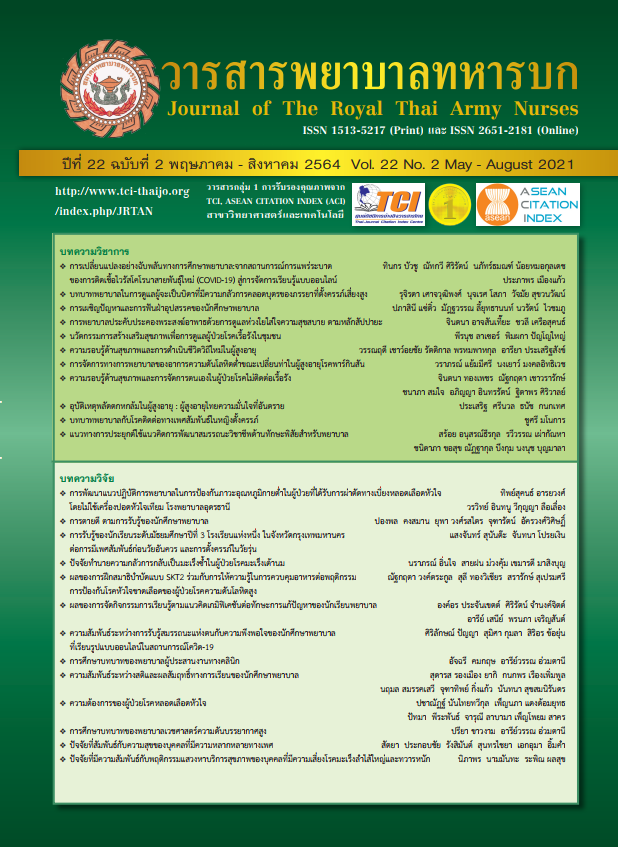The Relationships among Self-Efficacy and Satisfaction of Nursing Students who Received Online Learning in COVID-19 Situations
Keywords:
Self-efficacy, satisfaction of students, online learning, COVID-19Abstract
This study was a descriptive correlation research. The study aimed at investigating the relationships between self-efficacy and satisfaction of nursing students who received online learning in COVID-19 situations. The sample consisted of 300 nursing students who online learning and register summer semester in academic year 2019 in government and private university in the north-eastern region of Thailand. The instruments used to collect data included a demographic characteristic questionnaire, Online learning self-efficacy scale and online learning satisfied questionnaire. Data were analyzed using frequency, percentage, mean and Spearmen’s rank correlation.
The research findings revealed that self-efficacy was positively related to satisfaction of nursing students who received online learning with statistical significance (r = .666, p <.001). The study findings could be utilized to guidance for development self-efficacy promotion program in nursing students who received online learning.
Downloads
References
Netthat L. Globalization’ s Pandemic and Challenging of state and international society. LAW for ASEAN: by the Office of the Council of State of Thailand. 2020. (in Thai)
Center for Systems Science and Engineering (CSSE) at Johns Hopkins University: COVID-19 Dashboard. 2020.
Wanichanant P. Basic education in COVID-19 situations: How to Open-Close School. Thailand Development Research Institute. 2020. (in Thai)
UNESCO. COVID-19 Educational Disruption and Response. 2020.
UNESCO. COVID-19 Impact on Education. 2020.
Thongleamnaga P. Effect of COVID-19 in Global’s Education System and Thailand by economics’s perspective. 2020. (in Thai)
Sikkhaman K. The Effective Study in the English for Business Communication by Using E-Learning (research report). Bangkok: Sripatum University. 2011. (in Thai)
Saraketrin A, Rongmuang D, & Chantra R. Nursing Educationin the 21st Century: Competencies and Role of Nursing Instructors. Journal of The Royal Thai Army Nurse. 2019; 20(1): 12-20. (in Thai)
Kue Y. C. Interaction, internet self-efficacy, and self-regulated learning as predictor of student satisfaction in online education courses. The Internet and Higher Education. 2014; 20: 35-50.
Lee J. W, & Kim Y. E. Impact of Online Learning Self-Efficacy on Student Satisfaction from Online Higher Education. Journal of Customer Satisfaction Management. 2009; 11(2): 107-120.
Bandura A. Self-efficacy: The exercise of control, New York: Freeman. 1997.
Shen D, Cho M. H, Tsai C. L, & Marra R. Unpacking online learning experiences: Online learning self-efficacy and learning satisfaction. The Internet and Higher Education. 2013;19: 10-17.
Lioa P. W, & Hsieh J. Y. What influences internet-based learning. Social Behavior and Personality. 2011;39(7):887-896.
Banlue S. The suitable model of online learning and teaching for Ubon Ratchathani Rajabhat University. Journal of Roi Et Rajabhat University. 2017;11(2):250-260.
Bindulhem T. Effect of online teaching on learning achievement of the vocational certificate level 1. The 10th Hatyai National and International Conference. 2019; 1148-1157.
Tangpantong C. Factors Affecting Learning Achievement on Online Supplement Learning. Master Degree of Science Program in Information Technology in Business, Faculty of Commerce and Accountancy, Graduate School, Chulalongkorn University. 2017. (in Thai)
Cohen J. Statistical power analysis for the behavioral sciences (2nded.). New Jersey: Lowrence Erlbaum Associates. 1998.
Gebara N. L. General self-efficacy and course satisfaction in online learning: A correlational study (Doctoral dissertation). University of Missouri-Columbia. USA. 2010.
Lim C. K. Computer Self-Efficacy, Academic Self-Concept, and Other Predictors of Satisfaction and Future Participation of Adult Distance Learners. American Journal of Distance Education. 2001; 15(2): 41-51.
Faul F, Erdfelder E, Lang A. G, & Buchner A. G*Power 3: A flexible statistical power analysis program for the social, behavioral, and biomedical sciences. Behavior Research Methods. 2007; 39: 175-191.
Zimmerman W. A, & Kulikowich J. M. Online Learning Self-Efficacy in Students With and Without Online Learning Experience. American Journal of Distance Education. 2016; 30(3): 180-191.
Downloads
Published
How to Cite
Issue
Section
License
บทความหรือข้อคิดเห็นใดใดที่ปรากฏในวารสารพยาบาลทหารบกเป็นวรรณกรรมของผู้เขียน ซึ่งบรรณาธิการหรือสมาคมพยาบาลทหารบก ไม่จำเป็นต้องเห็นด้วย
บทความที่ได้รับการตีพิมพ์เป็นลิขสิทธิ์ของวารสารพยาบาลทหารบก
The ideas and opinions expressed in the Journal of The Royal Thai Army Nurses are those of the authors and not necessarily those
of the editor or Royal Thai Army Nurses Association.






